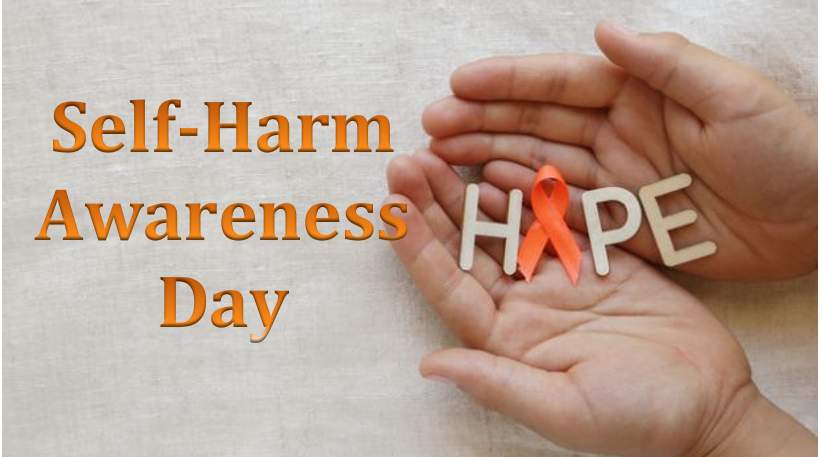|
As I’m sat typing this I am eagerly looking out of my window for any signs of another snow flurry, whilst happily munching on white chocolate fingers…seeing as I cant go out …what a perfect excuse for a lazy day.
Yet lazy days weren’t always easy for me. I’m the sort of person who has to be on the go – all the time. I have to keep distracted, keep busy, try and keep focused, just to try and keep the ‘monsters’ at bay in my head. Even now, having nothing to do all day can cause a little bit of fear in me- a spark to my anxiety. Lazy days before consisted of not feeling worthy enough to get out of bed, feeling like I deserved to punish myself; yet hoping if I could just fall asleep so my day would go so much quicker and at last I would have respite from ‘my head’. Today, I am 230 days clean from self-harm! And I feel like screaming it from the rooftops! But at the same time there is also a little part of me that makes me doubt if I will “never self harm again” and echo’s my fear of letting others down. But, we all have that little doubting, nagging voice inside of us, or as a friend once called it our little “brain gremlins”. They try to put us down, make us feel like we are not good enough, that maybe we are a failure, that we don’t matter, that we are useless. But we have to fight back!!! self-harm can take over your life, its an addiction, a coping mechanism, a way of expressing how we feel, and sometimes It is the only way we know to cope. But you do have the power to recover; you do have the strength to fight another day of torment. You’ve got this far…and that’s pretty AWESOME!!! Self harm can be such a huge scary secret that can feel like it over takes you, at first I thought self harm was my friend- it was there when I needed comfort, when I needed an outlet, when I was at the end of my tether…. but friends don’t control you!!! Finding alternatives to self-harm can be a key part to recovery, I found a great website Here which is full of self-harm alternatives, depending on how you feel and the reasons why. I still find it really helpful to remember that self harm urges come and go like waves; as big as it feels when it hits you, if you can distract yourself, or sometimes for me it was just knowing that it would pass and holding out until it did. The road to recovery is tough, and it’s a decision that only you can make, you will find strength that you never knew you had and there are people here to walk along side you cheering you on, people who will try and catch you when you fall. But that decision is yours and you are brave enough and strong enough to do this! I also created a leaflet, which has useful info for friends/family as well as having useful websites and phone apps, which you may find helpful. You can download/view the leaflet HERE Did you know, HSE statistics show that in the year 2015/2016, 11.7 million working days were lost due to common mental illness such as work related stress, depression and anxiety. These statistics also show that stress is more prevalent in public sector agencies such as health care, education, public administration and defence… Isn’t it ironic how those caring for the wellbeing of the wider society are often those impaired with their own mental ill-heath, inflicted - seemingly, by the work they carry out.
So, what is causing this? Research shows that the main triggers for mental ill-health at work stem from organisational factors such as: poor management structures and workplace practices, excessive workloads with little room for creativity and ownership of work product, insufficient resource for heavy demand, and interpersonal relationships within the workplace. The mental health foundation suggest that businesses could save up to £8billion per year if they provided adequate support for mental health in the workplace, with a calculation of £347,722 in savings for an investment of £40,000 into information, training and consultation with their staff around mental health concerns. That's a saving of £8.69 for every £1 invested! Severe stress causes the body to have a ‘fight or flight’ reaction, releasing a number of chemicals including adrenaline, cortisol and norepinephrine. In a natural environment, these chemicals would mobilise a lot of energy in preparation for physical action. Sometimes we experience this reaction when ‘dealing well under pressure’; however, severe and prolonged periods of stress can cause these chemicals to become toxic in the body, causing inflammation to the brain, depressive illness, sleep disturbance and in some cases brain damage! We use ‘The 5 Ways to wellbeing’ which is an approach to decrease mental health problems and promote flourishment for people in all walks of life. We design a wellbeing plan that incorporates this for all our team members, as well as the people we support. It was designed by Foresight, through a project that considered how to achieve the best possible mental development and mental wellbeing for people in the UK. The 5 ways to wellbeing suggests that we should: Connect, Be Active, Take Notice, Keep Learning, and Give. So where have these come from and how can we incorporate them in the workplace? Being active So we all know that exercise is good for us, right? But how often are we actually committing ourselves to the right level of exercise to benefit both our physical and mental health? Adults should be carrying out 150 minutes of moderate activity per week, as well as strength exercises to stay well - that’s 30 minutes, 5 days a week. Doing this will release dopamine and serotonin, having an anti-depressant effect. It also promotes mental sharpness, and even has anti-ageing effects! – Count me in! Often the problem we face with exercise is that we just can’t find the motivation to get to the gym! Instead, we find all kinds of reasons not to. This is a natural response by the brain, which tells us that the gym is an unnecessary waste of energy supplies, a fruitless task. If this sounds like you, try making exercise more natural, and better still social. Things like walks with friends or loved ones, replacing car journeys with cycling or jogging, or playing games that involve physical exercise. If you’re an employer, why not consider the ‘ride to work scheme’, employee outings during breaks – walks, games, or even after work sports clubs? Not only will this promote physical activity, but also better working relationships between staff. Connect So that takes us nicely into the social needs of humans. Just as we have a basic need for food and shelter, we also have a basic need to belong to a group and form relationships. Countless studies have shown that quality social interaction helps with cognitive sharpness, and even puts a stop to our stress response. Psychologists have suggested that seeing a friend several times throughout the week increases our happiness 5x. Feeling ‘part of the team’ and building relationships in the workplace are important, as this is where we spend much of our time. Positive communication, recognition, and group activity can have a great impact on the wellbeing of team members. Take notice This one is about the kind of stuff that sometimes gets left behind when we are feeling stressed. Take in the world around you, notice the beauty in things, reflect, relax. Sometimes this is about having the right life/work balance. Without spending time just for us, we can’t always see beyond the blinkers. Relaxation therapy and meditation is said to release GABA: “The Anti-Anxiety Molecule”, having a similar effect to benzodiazepines! Keep Learning Learning isn’t just about classrooms in school. It’s about challenging ourselves, and achieving! The sense of achievement also releases dopamine – the happy reward chemical. Setting goals and challenges that require you to develop is a prime way of achieving this, regardless of what age you are! Managers – Take time one-to-one with your staff to set goals, and offer new challenges to their career. Additional responsibilities and opportunities to learn can be beneficial to both parties – but don’t forget to recognise your employee’s hard efforts, and give them a sense of being appreciated and part of the team! Setting up a mentorship programme at work can be a huge benefit to both business and team member. This provides a great opportunity to connect, learn and give. Give So we all know that giving helps others, whether you donate, volunteer, or give a hand to a person in need; But did you know, that it has positive effects for the giver also? It is said to reduce depression, stress, and blood pressure, and heighten our self-esteem. The sense of satisfaction from helping another person releases serotonin (mood stabilising), dopamine (feel good), and Endorphins (endogenous opioids) – thus the term ‘helpers high’ – like any other high, this one is also addictive! Why not gain a healthy addiction, and volunteer to help others with valued lives, or contact volunteer Cornwall to find a wide range of voluntary opportunities to suit your interests and ambitions! Valued Lives are offering workplace wellbeing consultancy and training packages as rewards for our crowdfunder! Take a look, http:www.crowdfunder.co.uk/valuedlives  How many times do we greet another person in a week? How many times do we discuss the weather? I read an interesting article today where social anthropologist Kate Fox states that 'According to recent research, 94% of British respondents admit to having conversed about the weather in the past six hours, while 38% say they have in the past 60 minutes. “This means at almost any moment in this country, at least a third of the population is either talking about the weather, has already done so or is about to do so,”' We spend so much time talking about a topic that isn't particularly interesting, and completely meaningless, where we could be using that time to connect with the people in front of us - and possibly save a life. I hear you frowning and muttering under your voice that my last statement was a little melodramatic... So let me explain myself... In 2015 there were 6,639 suicides in the UK, this had risen from 6,581 in 2014. These numbers are only those that were officially reported to be death through suicide, and it is expected that the number would be much higher if we included inconclusive cases. So that was 6k+ people who probably also adopted the British culture of talking about the weather. I'm curious as to how many people they spoke to in the weeks/months leading up to their deaths... 'Suicide happens without warning'... This is a myth. A person contemplating suicide will most likely display behavioural whispers of despair, but for a person who is non-receptive to these, they could go unheard. Instead of talking about the weather when we interact - Why not ask how somebodies week is going? This is an open question which triggers engagement between parties, it's not as easy to spring up with a generic answer, and so provokes real life discussion, where you may learn truly, how a person is - and not just the likelihood of their garden needing a water over the weekend. How do you think a person may be feeling when contemplating suicide? How would they respond when you ask them how things are going? The person may be feeling trapped, like there is no way out. Knowing that somebody is genuinely interested in how they are, and what they have to say - could be a turning point. Always show a genuine interest, why would one open up over a passive utterance in the corridor? We would only solidify the feelings of solitary existence. Look for tell tale signs of withdrawal, feelings of hopelessness, anxiety, agitation, inability to sleep, dramatic changes in mood (including a sudden improvement following a bout of depression), increasing drug or alcohol use, or perhaps making out-of-the-blue arrangements, such as giving away possessions. The person may be open of their thoughts to suicide, or that they have been self harming. Dont be afraid that asking the person about suicide could 'plant a seed' this is also a myth; in-fact, quite the opposite is true. Asking somebody directly about their thoughts to suicide will show your concern, allowing the person to talk about their problems: which may reduce their anxiety. They will feel less isolated, and perhaps even relieved. Once somebody has decided upon a plan to suicide - it is not too late to intervene, a solution may be found by any person who shows concern and the willingness to help. Do:
If the person is refusing help, and is in immediate danger call 999. There are a number of agencies and charities who also deal with crisis, this will differ county to county. Be honest with the person about what you are doing, this may cause them to become angry or feel betrayed, but this is better than ignoring the problem, hoping it goes away and then finding out that the person has carried out their plan to suicide. I hope that when you ask the question - How has your week been going? That the person your talking to smiles and tells you how great it has been; but please, don't waste those vital moments of contact talking about the weather. |
Shoni HaswellCEO - Valued Lives Archives
March 2018
Categories |
|
Valued Lives
Unit C2 Glenthorne Court Threemilestone Ind. Est. Truro Cornwall TR4 9NY |
Tel: 0800 260 6759
Office: 01726 438673 E: [email protected] Registered Charity Number 1175695 Company number 10713799 |
|
Website Navigation |


 RSS Feed
RSS Feed



